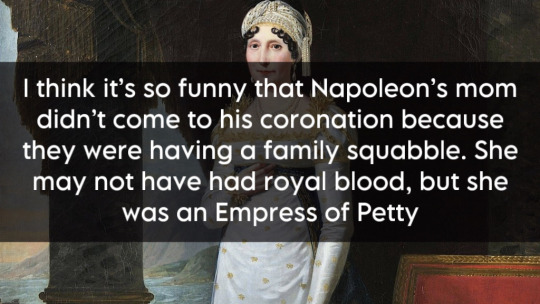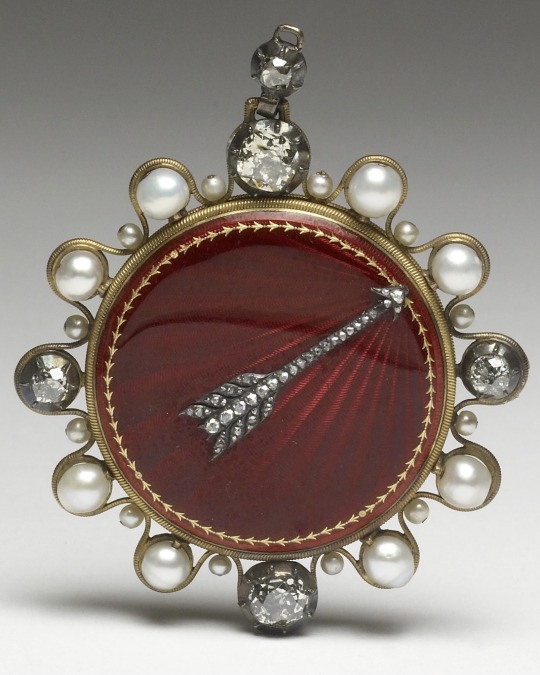#letizia Bonaparte
Text
Napoleon’s mother had a watch made for her as she lost her eyesight that was designed for her to tell the time by touch instead of reading numbers.

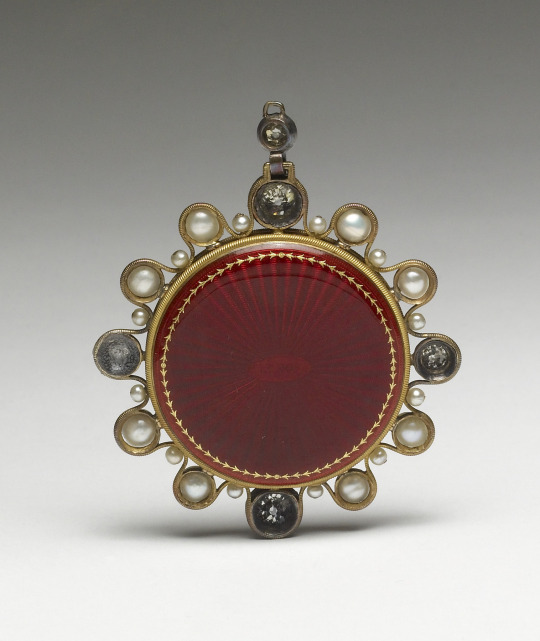
According to the Walters Art Museum:
This unusual watch has no numbers, it belongs to a type called "montres à tact" or discrete watches. The clever design allows the time to be told by touch alone, feeling the four diamonds on the hour and the quarters, and the pearls that mark the remaining divisions of the twelve hours. The raised arrow, also in diamonds, contrasts with the smooth surrounding enamel, taking the place of watch hands. It was made for Maria Letizia Bonaparte, Napoleon’s mother, who lost her sight as she aged.
The case employs a process called guilloché, where subtle but kaleidoscopic effects are created through mechanical means. Geometric shapes are carved into metal by engine turning. The resulting patterns of fine lines are covered with transparent enamel, when light hits them it creates oscillating optic effects.
Pierre Benjamin Tavernier (Jeweler), Basile Charles Le Roy (Clockmaker), Early 1800s
#letizia Bonaparte#letizia#napoleonic era#napoleonic#watch#jewelry#jewellery#pretty#accessories#history#19th century#Walters art museum#french empire#first french empire#empire style#empire#france#Italy#fashion history#1800s
412 notes
·
View notes
Text
Napoleon 2023, Review
I saw this with @idefilarate, and it was such a train-wreck. There was so much wrong with it, in the funniest way imaginable. We spent the entire film whispering what was wrong to each other.
This will be a long post, and I’m aware a lot of other people have already made some excellent points on here.
I can see what Ridley Scott was attempting with this film, and there are several reasons it didn’t work. I also have some historical specific points to make.
Directing Choices, Acting Problems, and the English Propaganda
It can be argued that Scott was trying to show Napoleon in a “more human” light, and I am always perfectly happy with that interpretation. It could also be argued he was deliberately showing Napoleon in a negative light, which I am also fine with. However, this film didn’t really do either. Napoleon did not seem more human for his brutish behaviour to Josephine, the childish tantrums or the forced jokes. If Scott had wanted a proper negative light, he would have focused on Napoleon’s ruthlessness, such as with the Massacre in Egypt, and his willingness to bypass the laws.
The overall sense I got when watching the film was that it was too compressed. The action went from point to point without showing how on Earth it got there. We had about ten minutes of Napoleon as consul, and then he was unexpectedly emperor, with a token line from Talleyrand about becoming emperor. Too much stuff in not enough time. However, I was also bored. By the time it got to Napoleon on Elba, I half felt like taking out my phone and doing something else. There was no narrative arc to keep the load of action in place, and the characters went through no real development.
There was some good acting. The lady playing Letizia Bonaparte was excellent, for the ten minutes we saw of her, as was Talleyrand. There were even a few scenes with the main characters (like Josephine cooing over the baby) that I actively enjoyed. But for the main part, every character had one mode and that was it. Napoleon was sulky and incompetently panicked. Josephine was moody or upset in a coquettish way. Tzar Alexis I was obnoxiously cheerful about everything.
I can see, as others have pointed out, that Scott was following English propaganda of the “Corsican Ogre”. However, he payed no attention to the fact that Wellington had a good deal of respect for Napoleon as a general, and that part of Napoleon’s charm for the English press was just how astonishingly unexpected he was. This wasn’t a caricature of Napoleon. This was a caricature of a caricature.
Historical Inaccuracies
Oh. Where to start with the many many many things that were wrong with this. I am fairly lenient when it comes to historical accuracy in fiction. Authors and filmmakers are allowed some artistic liberties, otherwise they wouldn’t be writing fiction. However, the sheer amount of nonsense Scott made up is incredible. I am going to list it in bullet-points, so as not to rant too much:
The age gap between Josephine and Napoleon, and how that messed up their relationship.
The utter butchery of FRev, including Marie Antoinette executed in 1789, and Robespierre looking like Danton and spouting random nonsense.
Hot-shot destroying the ships in Toulon harbour, whilst N hadn’t finished capturing little Gibraltar.
Josephine’s dress hanging off her shoulder as if she were a whore.
The lake battle with “the high ground”. It doesn’t deserve the name of Austerlitz.
The lack of tactics in any of the battles. Just men running at each other.
Josephine and Napoleon’s relationship being at best toxic and strained.
Napoleon returned from Elba because Josephine had a fling with Alexander, despite the fact Josephine had historically died earlier that year.
Letizia making Napoleon cheat randomly.
The scopes at Waterloo, the lack of farmhouses, the tents just behind the lines.
Wellington being clumsy and talking too much nonsense.
The use of Ça Ira and the Camagnole (which was in itself somewhat good), but the utter lack of any of the other excellent Napoleonic folk songs and military marches.
That is all that immediately comes to mind. Having said all that, I did enjoy the cinematography, and it was worth seeing, just to confirm my suspicions that it was a mess, and that there are many better films. Hopefully you’ve enjoyed this rant! Let me know if there’s anything I’ve missed off the list of failings.
#napoleon 2023#napoleon bonaparte#josephine de beauharnais#Letizia Bonaparte#frev#french revolution#napoleonic wars#maximilien robespierre#film review#historical musings#what the fricking hell was that mess#poor marshals. they basically didn’t exist
35 notes
·
View notes
Text
EIGHT SURVIVING CHILDREN OF CARLO AND LETIZIA BONAPARTE, SIBLINGS OF NAPOLEON I 🥺🌟♥️

254 years ago on this day, Napoleon Bonaparte, the first French emperor was born
On the occasion of his birthday, meet the Eight surviving children of Carlo and Letizia Bonaparte, who lived to adulthood
Letizia Bonaparte gave birth to 13 children between 1768 and 1784; five of them died, two at birth and three in their infancy...😥🥀
Among the 13 children, the first child who died was Napoleone Buonaparte, who was born on August 17, 1765 and died on the same day... The last child to die was Jérôme Bonaparte, who died 95 years after his eldest brother...
The registered names of all the children of Carlo and Letizia Bonaparte:
• Napoleone Buonaparte (born and died 17 August 1765)
• Maria Anna Buonaparte (3 January 1767 – 1 January 1768)
• Joseph Bonaparte (7 January 1768 – 28 July 1844)
• Napoleon Bonaparte (Later French emperor) (15 August 1769 – 5 May 1821)
• Maria Anna Buonaparte (14 July 1771 – 23 November 1771)
• A stillborn child (1773)
• Lucien Bonaparte (21 March 1775 – 29 June 1840)
• Maria Anna (Elisa) Bonaparte (3 January 1777 – 7 August 1820)
• Louis Bonaparte (2 September 1778 – 25 July 1846)
• Pauline Bonaparte (20 October 1780 – 9 June 1825)
• Caroline Bonaparte (25 March 1782 – 18 May 1839)
• Jérôme Bonaparte (15 November 1784 – 24 June 1860)
#Carlo Buonaparte#Letizia Bonaparte#Joseph Bonaparte#Napoleon Bonaparte#Lucien Bonaparte#Elisa Bonaparte#Louis Bonaparte#Pauline Bonaparte#Caroline Bonaparte#Jérôme Bonaparte
67 notes
·
View notes
Text
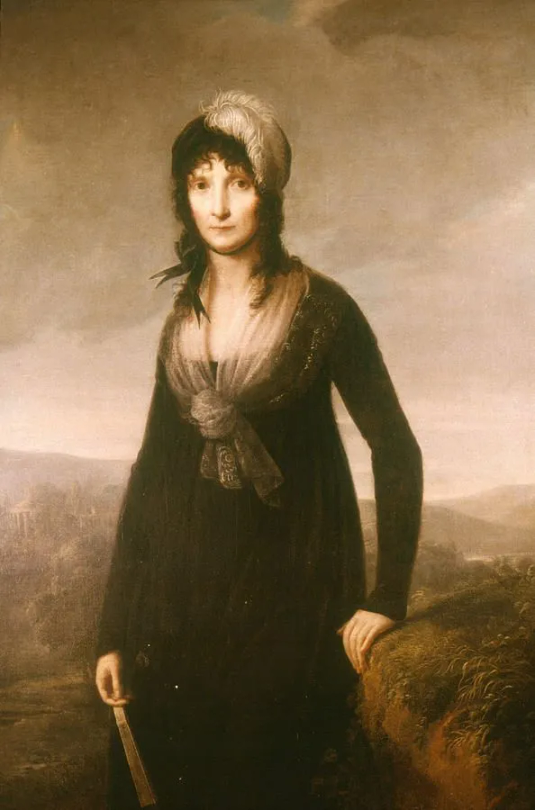
Letizia Bonaparte by Jean-Baptiste Greuze, 1800
9 notes
·
View notes
Text
Happy birthday to Letizia Bonaparte! August 24, 1750

7 notes
·
View notes
Note
Is the quote, "Pourvu que ça dure!" attributed to Napoleon's mother actually real and if so, do you know more of the context around it?
That is an excellent question! I've just checked and saw that French Wikipedia even claims poor Letizia originally coined that phrase - though of course with a Corsican accent: pourvou qu'ça doure!
That claim at least can be easily disproven by a quick check in Google Books. The expression "pourvu que cela dure!" was used quite some time before Napoleon's mother became prominent enough for anybody to notice what she said.
Interestingly enough, I also could not find any mention of her saying that in the pamphlets of the Second Restauration; that's where I suspected the anecdote came from (as it mocks the Corsican accent, thus pointing out the "foreign" origins of the Bonaparte family, while having even Napoleon's own mother doubt her son's rise to power will last).
The very first mention I could find (but maybe somebody can correct me on this?) was as late as 1892 (!), in the writings of one ... here it comes ... Hippolyte Larrey.
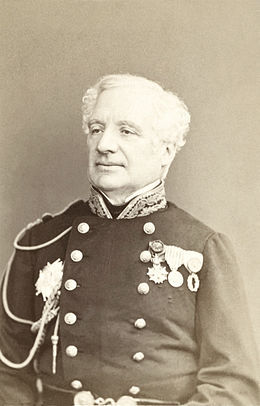
Yes, that would be Dominique Larrey's son, who apparently wrote a lengthy essay in two volumes about Napoleon's mother. That's the same guy who also seems to be the reason why, whenever the medical service of the First Empire is mentioned, everybody thinks of one regimental surgeon, while all the other doctors are mostly ignored.
Needless to say that I'm highly suspicious about this. Even more so, as Hippolyte Larrey gives as his source "l'archiduc Charles-Louis d'Autriche" - archduke Karl Ludwig of Austria? Who was only born in 1833. So how would he know what Letizia said during the First Empire?
Unless somebody can provide us with a better source for that quote, I would rather treat it as apocryphal.
From the little I have read on Napoleon's childhood, I had the impression it's best to be very careful. From what we really know, there is no indication "Madame Mère" ever had much of an influence on her son or a special meaning in his life. Much of what is reported about her may just be legend. According to Pierre Branda's biography of Joseph Bonaparte, it's not even clear if Carlo and Letizia were ever properly married in church. At least there's no such certificate, and apparently it was not unusual in Corsica for couples to just move in with each other, and after a certain time they were considered legally married.
We really seem to know very little about that woman for certain.
Thank you for the Ask, and thanks to everybody who has something to add, as always!
5 notes
·
View notes
Text
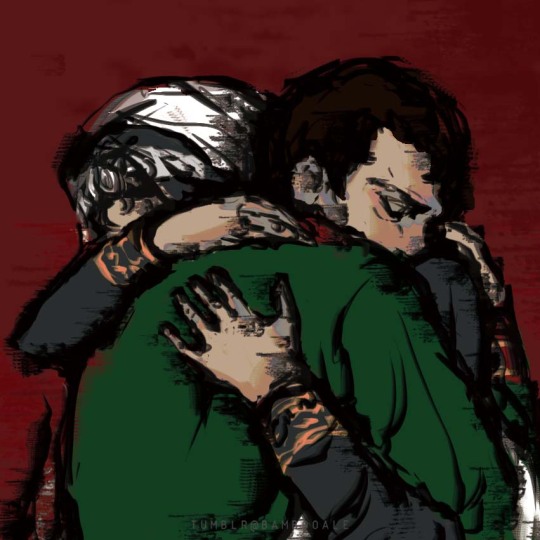
"No matter what kind of identity you are, you are always a mother's child."
Celebrating Mather's Day!
*The movements of the characters are referenced.*
80 notes
·
View notes
Text
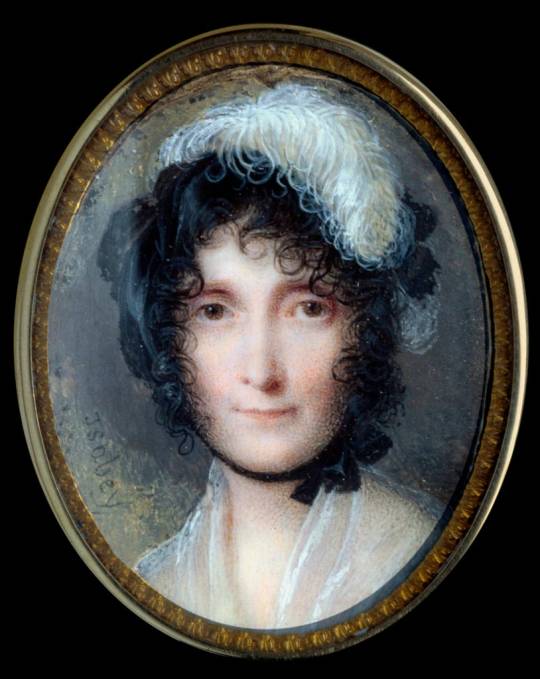
Portrait of Laetitia Bonaparte (Letizia Maria Ramolino) (1750-1836), mother of Napoleon Bonaparte Miniature painting on ivory by Jean Baptiste Isabey.
#jean baptiste isabey#dynastie bonaparte#bonaparte#buonaparte#french empire#letizia maria ramolino#maison bonaparte
7 notes
·
View notes
Text
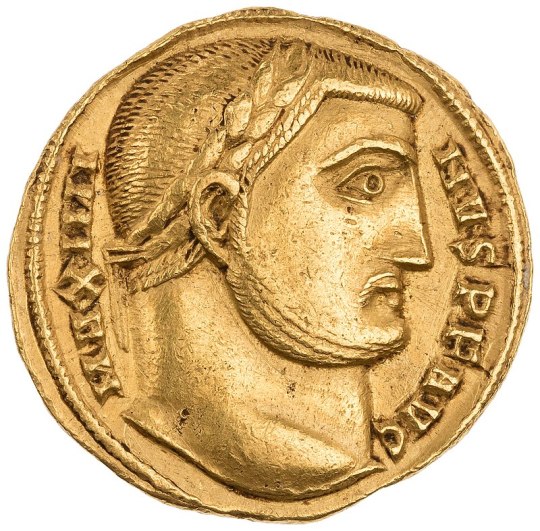
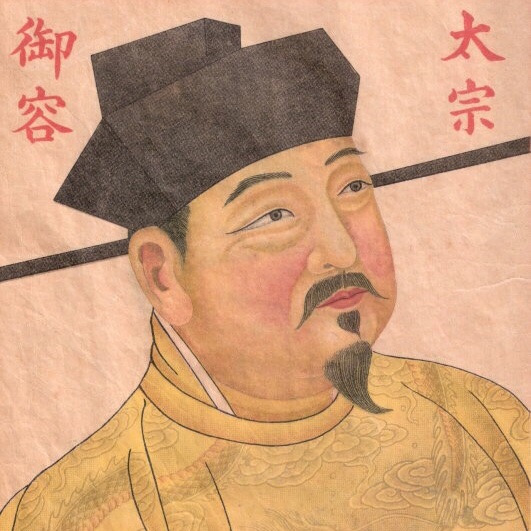
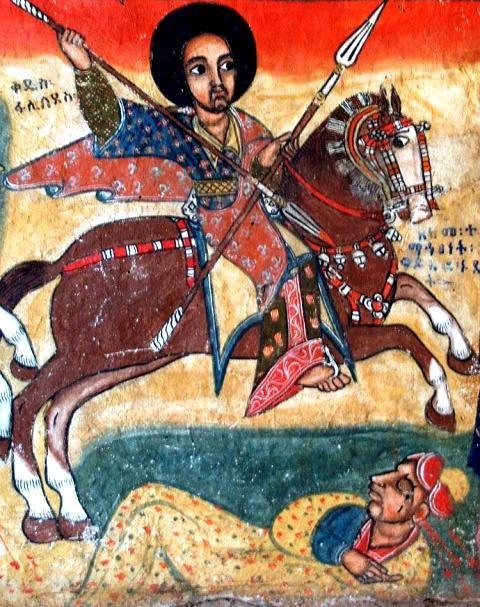
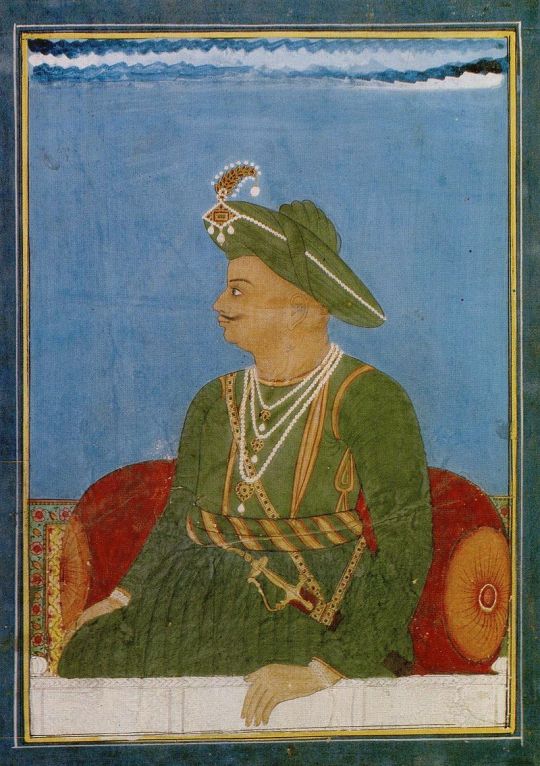
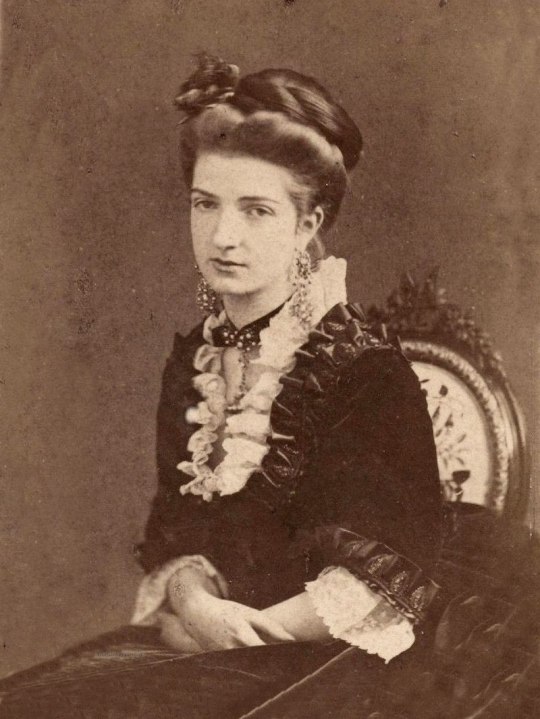





Royal Birthdays for today, November 20th:
Maximinus II, Emperor of Rome, 270
Taizong of Song, Emperor of China, 939
Fasilides, Emperor of Ethiopia, 1603
Tipu Sultan, Ruler of Mysore, 1750
Margherita of Savoy, Queen of Italy, 1851
Maria Letizia Bonaparte, Duchess of Aosta, 1866
Alexandra of Sayn-Wittgenstein-Berleburg, Countess of Pfeil, 1970
Sofia, Princess of Bulgaria, 1999
Umberto, Prince of Bulgaria, 1999
Theodora, Princess of Liechtenstein, 2004
#maximinius ii#taizong of song#tipu sultan#margherita of savoy#Alexandra of Sayn-Wittgenstein-Berleburg#Fasilides#Maria Letizia Bonaparte#sofia of bulgaria#prince umberto#theodora of liechtenstein#long live the queue#royal birthdays
6 notes
·
View notes
Text
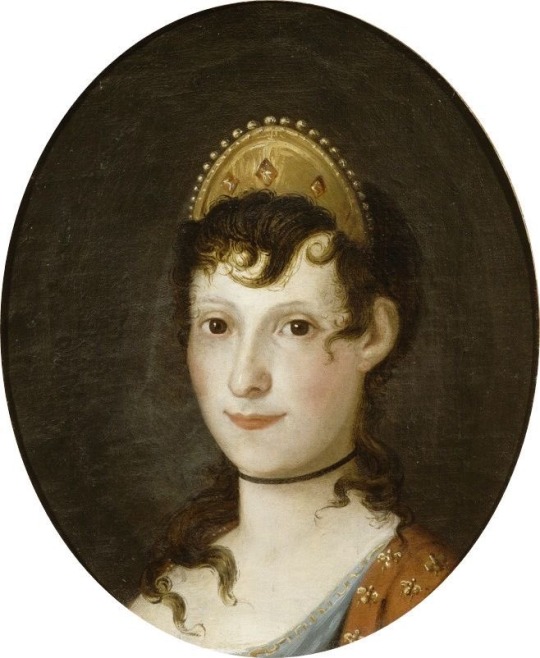
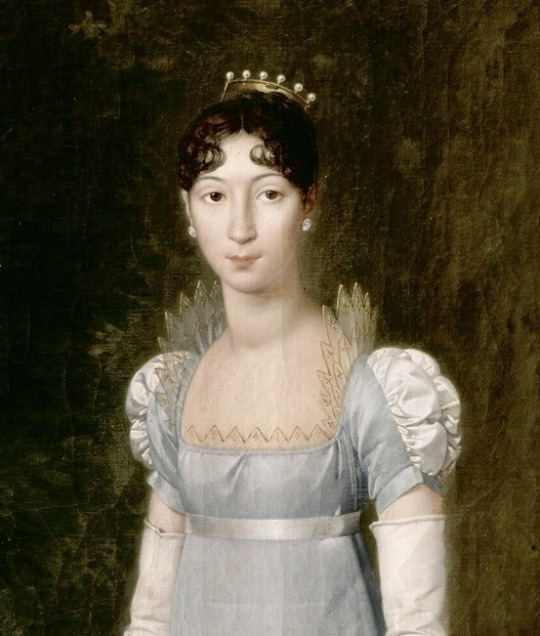
Letizia Bonaparte (left) and her granddaughter, Charlotte Bonaparte Gabrielli (right)
#she had two granddaughters named Charlotte Bonaparte btw#and potentially a third named Charlotte (last name not Bonaparte) 💀#letizia#letizia Bonaparte#letizia Ramolino Bonaparte#Napoleon’s mother#Charlotte Bonaparte#Napoleon’s niece#Napoleon’s family#Charlotte Bonaparte Gabrielli#napoleonic era#napoleonic#napoleon bonaparte#napoleon#paintings
21 notes
·
View notes
Text
I had an adaroable adorable dream about Murat. It was a 5 seconds animation of him walking with the other marshals and Napoléon in the evening to an event. They are outside, it's dark and the lights gave a festive mood. Joachim is headed to the door as he innocently looks back because he thinks to have heard a trusted voice call for him and sees his baby daughter Letizia who is really tiny but able to walk running to him with open arms. 🥺😭💕 His face impression is shook and he immediately bends down to grab her so she doesn't get lost anywhere. She giggles and Murat gives her a kiss to the head and presses her to his heart and shoulder.
The other marshals like Ney and Bessi looked back as well and just smiled a little bit while they stand next to Murat. Napoleon who must have heard it too didn't look back because he was talking to Berthier or something (Naps was surrounded by a lot of people)
I really need to animate this but I don't have the time or the resources for it. :(
#I dreamt about Murat#joachim murat#letitia murat#napoleon's marshals#jean baptiste bessières#michel ney#napoleonic era#napoleon bonaparte#louis alexander berthier#I would love to animate this 😭💕#Don't ask me how Letizia got there. That's a question Joachim asks himself too and I have no answer for now.#She can't just walk away from home to the event. She is way too tiny for that. 😭😭😭
15 notes
·
View notes
Photo
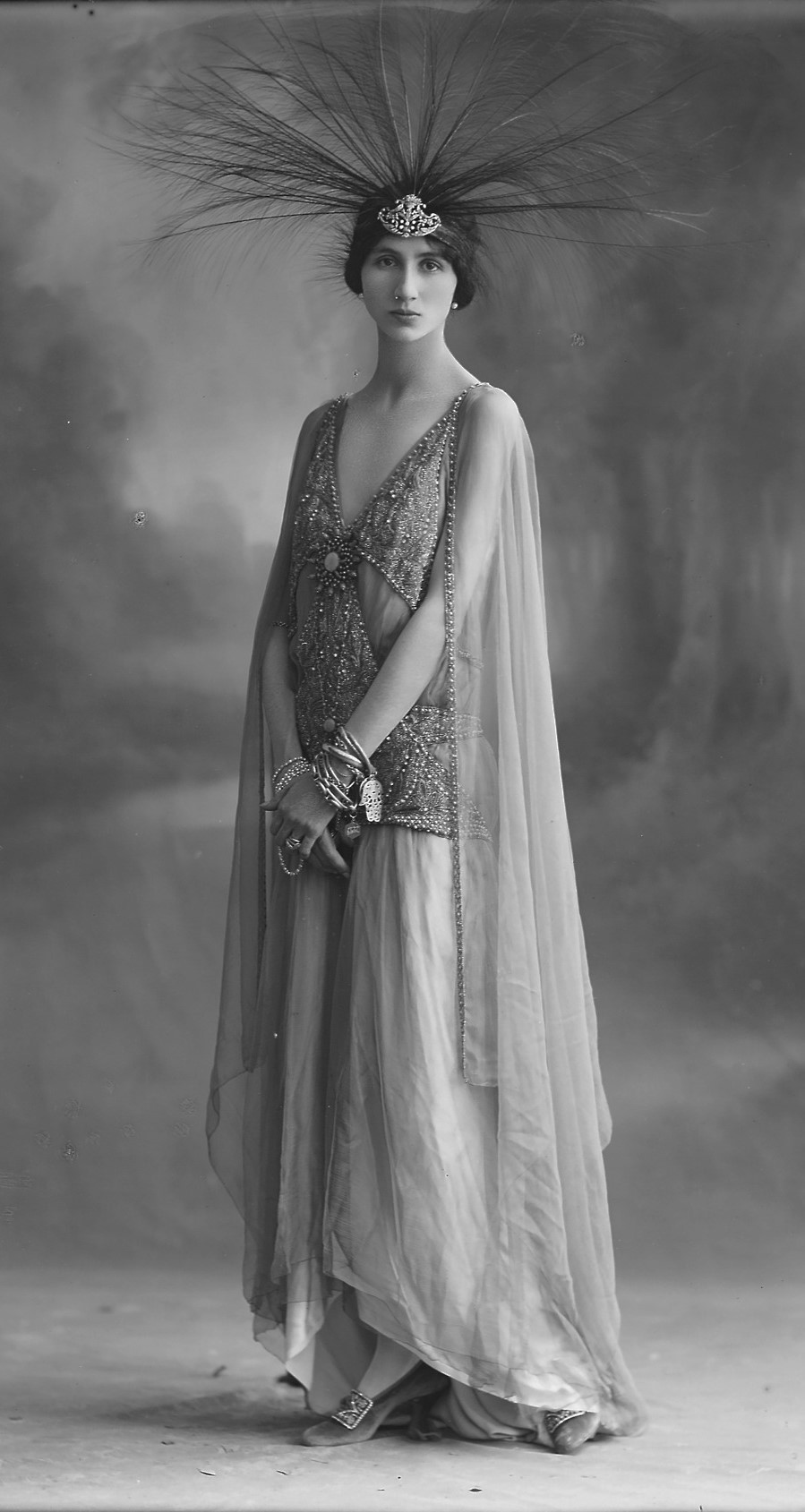
La Contessa Spalletti (La Contessa Rosa Spalletti, Countess Rosa Spalletti Lanza di Scalea), Photo by Mario Nunes Vais, 1915.
Possibly a daughter of Gabriella Rasponi Spalletti who was born in Ravenna Rasponi April 10, 1853 by Cesare Rasponi Bonanzi (1822-1886), vice consul in France, a deputy in Lanza governments and De Pretis and later senator of the Kingdom of Italy and Letizia Rasponi Marat (1832-1906), daughter of conte Giulio Rasponi, and granddaughter of Gioacchino Marat and Carolina Bonaparte (1782-1839), Napoleon’s sister.
Villa Spalletti Trivelli in Rome.
#La Contessa Spalletti#1915#portrait#photography#mario nunes vais#countess spalletti#la contessa rosa spalletti#la contessa#rosa spalletti#gli italiana#1910s#aigrette#1910s aigrettes#aigrettes#1910s fashion#antique#1910s italian fashion#italian fashion#vintage italian fashion#letizia rasponi marat#giulio rasponi#gioacchino marat#carolina bonaparte#cesare rasponi bonanzi#gabriella rasponi spalletti#Rosa Lanza dei principi di Scalea#rosa lanza di scalea#nunes vais#Countess Rosa Spalletti Lanza di Scalea#actress
80 notes
·
View notes
Text
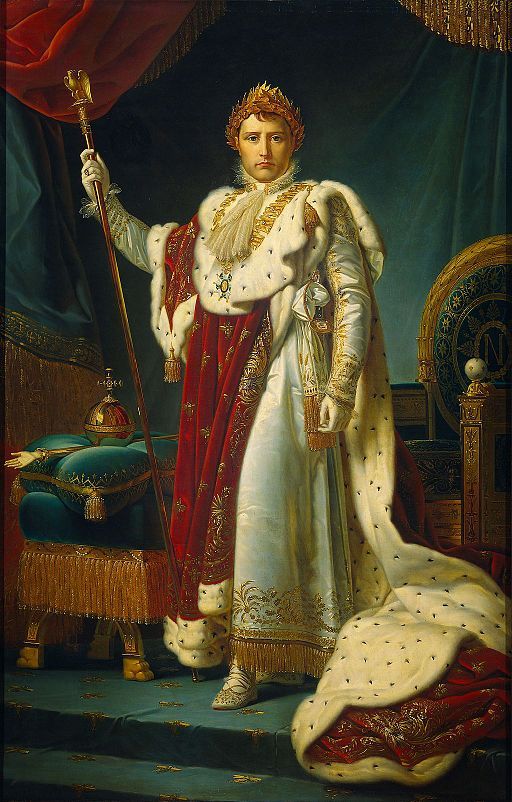
Happy birthday Napoleon!

The house in Ajaccio, Corsica in which Napoleon Bonaparte was born.
Napoleon Bonaparte was born on Tuesday, August 15, 1769, in Ajaccio, Corsica. France had acquired Corsica from the Italian city-state of Genoa the year before. Napoleon’s parents were Carlo and Letizia (Ramolino) Buonaparte. Their first surviving child, Giuseppe (Joseph), was 19 months old when Napoleon was born. Two older children, born in 1765 and 1767, had died in infancy.
August 15 marks the celebration of the Catholic Feast of the Assumption of Our Lady the Virgin Mary. Letizia was at mass in the Ajaccio cathedral when she felt severe labour pains. She left the service and walked the short distance to her house (Casa Buonaparte, now a museum), aided by Carlo’s sister Gertrude Paravicini.
Here, on a couch in the salon – for there was no time to reach her bedroom – with the assistance of Gertrude and a maid-servant, Mammucia Caterina, she was delivered of her fourth child – a boy, with a big head and a very intelligent face, who screamed loudly, and soon began sucking his thumb, which was considered a good augury among the peasants of Corsica.
Nine days later, Letizia turned 19 years old.
Nobody recorded anything about Napoleon’s birth at the time, and Letizia did not leave detailed memoirs. It wasn’t until Napoleon became a famous general that people became interested in his origins. Many myths sprang up surrounding his birth, which you can read about here (along with one element of Napoleon’s birth that might appear to be mythical but actually is not): https://shannonselin.com/2016/08/birth-napoleon-bonaparte/.
33 notes
·
View notes
Note
https://youtu.be/7ninavT3VaA?si=6MpehliHG7kW4Mm5
I don't remember if anyone ever sent you this? The context is that the guy is explaining a movie about penguins, but the girl thinks by "empereur" he means an actual emperor like Napoleon
? Yes, a few people have sent me this documentary, but I don't know what you mean. That guy says some odd things, but the point is, it shows a horde of Napoleons marching across Antarctica to breed. It happens sometimes. Where do you think Napoleons come from, hmmm? From Letizia Bonapartes? Bah.
#//very funny 10/10 i recommend everyone click the link and enjoy it#//it has been submitted and is arguably one of the subconscious inspiratons for this blog but AAAAH it's so funny so i mostly say thank you
8 notes
·
View notes
